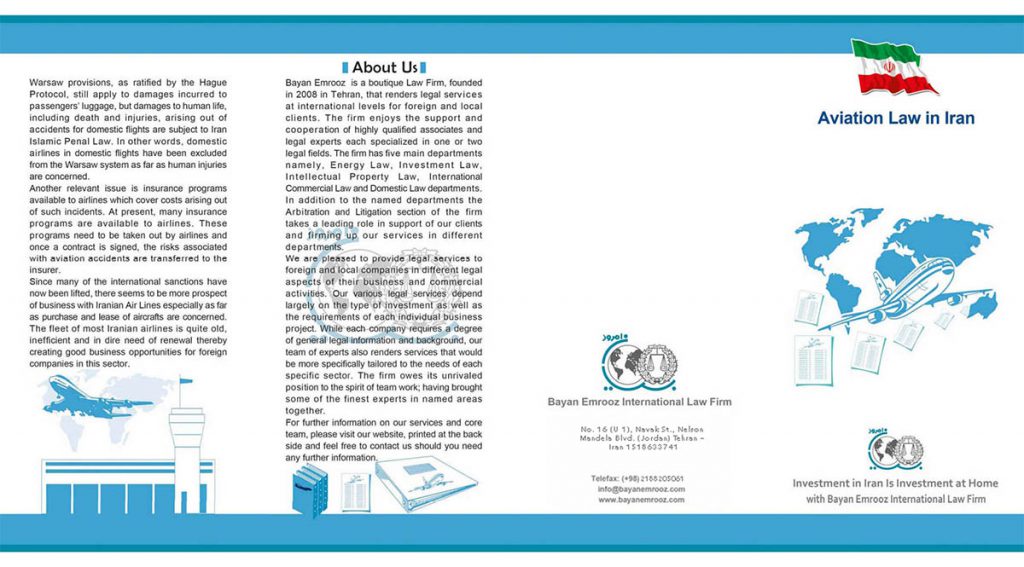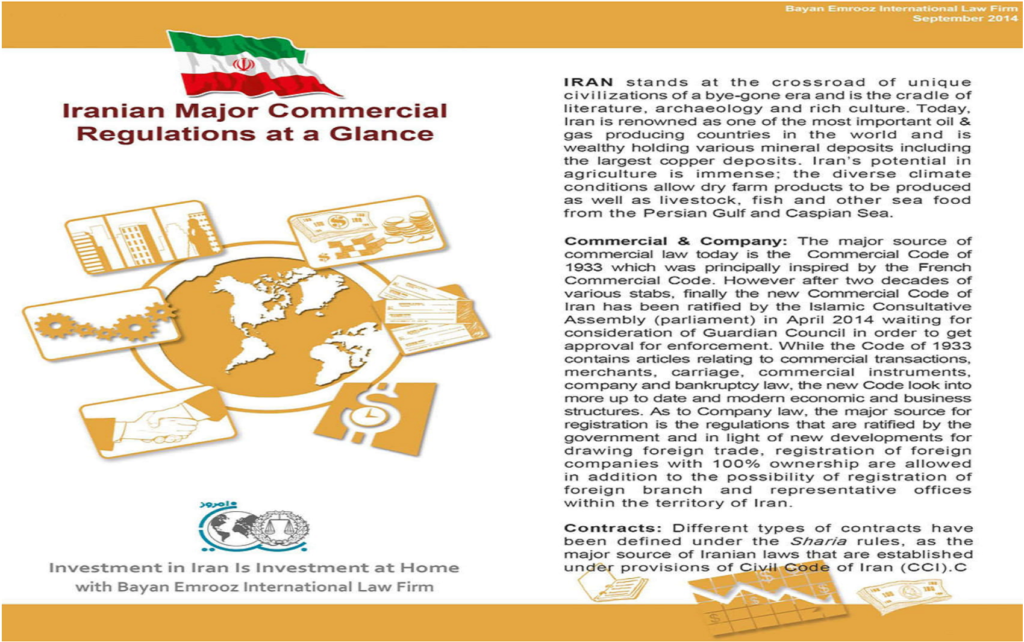Review of Regulations regarding Employee-Employer Relations in Iran
Being familiar with the regulations regarding employee-employer relations is one of the important aspects of investment and business in Iran. Since protection of employees and supervision of employment relations are among the fundamental legal issues in most countries, it would be matter of great importance for the investors and employers to be familiar with the laws and regulations in this field as well as the employment contracts. This brochure provides you with some information regarding the regulations governing the employment contracts, the termination thereof and the authorities investigating the disputes between employees and employers before Dispute Determination and Settlement Committees of Employment Organization as well as the Administrative Justice Court. Here, you can also find a brief introduction regarding the fundamental obligations of employers, the knowledge of which is an incontrovertible necessity for investors and employers. It should be noted that most of these regulations have been provided in the Iranian Labor Law 1990 and the Labor Procedure Law ratified on January 26, 2013 and some other governmental bylaws and directives.
According to Article 7 of the Labor Law “an Employment Contract is a written or verbal agreement upon which the Employee performs a task for the Employer for a temporary or non-temporary period in exchange of remuneration”. As regards the term of employment contracts, if the term is not determined for tasks that have a perpetual nature, the term of the contract would be deemed unlimited. As the rights that the law has provided for employees such as insurance, working hours, minimum salary and remuneration, etc. are of a protective nature, the regulations containing such provisions are considered to be imperative and any agreement contrary to such provisions are null and void. It should also be taken into consideration that the main criterion for determining the employment contract is the nature of agreements between parties and not the mere title that the parties have chosen for their contract. Therefore, even if the parties have entitled the contract “the Contractor-ship Contract”, it is still possible to consider it an employment contract provided that it is truly and in nature an “Employment Contract”.
Termination of the Employment Contract
According to Article 21 of the aforementioned Law, an employment contract shall be terminated in the following instances:
- Death of the employee
- Retirement of the employee
- Total disability of the employee
- Termination of the terms in temporary contracts
- Performing the task in the contracts regarding specific tasks
- Resignation of the employee
According to recent changes, two further instances were added to Article 21 above:
- Cancellation the contract in accordance with the terms provided in the contract (termination of the employment contract in accordance with the Law)
- Suspension of the employee and using the Unemployment Insurance by the employee according to the regulations.
In this Law, the unilateral termination of the contract (rescission) by the employee is referred to as Resignation. Moreover, neither the employer, nor the employee can unilaterally terminate the “temporary” or “specific task” contracts. It is merely possible to terminate such contracts through the agreement of both parties. In addition, unilateral termination of the contract by the employer which is referred to as “Dismissal” is only permitted in one occasion and that is when the employee has committed negligence in regard to performing the obligations or has not observed the Working Disciplinary Regulations. Even in these occasions, the employer must carry out an enquiry from certain authorities in order to be able to terminate the contract unilaterally. This issue has been copiously described in Article 27 and 28 of the Labor Law. Some of the requisites mentioned in these articles are as follows: the Islamic Council of Work must be held and they must confirm the misconduct of the employee. Only after such confirmation, payment of the delayed remuneration and receivables as well as payment of an amount of money equal to the last remuneration of the employee for each year of working for the employer which is referred to as the gratuity, can the employer terminate the employment contract unilaterally. Nevertheless, it should be noted that even after such legal formalities are observed, the employee has the right to object to the unilateral termination by the employer before the competent authorities. According to the law on “Eliminating the Impediments of Competitive Production and Enhancing the Financial System of the Country” ratified on May 10, 2015, some provisions of the Labor Law such as termination requirements have been amended in order to protect the employers. Accordingly, due to the economic situation of the country or the status of the company such as changes in administrative or technical structure, decrease of production, etc. the employer might encounter the necessity of decreasing the workforce and intend to terminate the employment contracts. However, as mentioned previously, according to the Labor Law and also recent regulations, termination is an exceptional matter and as for some employment contracts, the termination clause shall even be considered as null and void. It should be mentioned though that according to the recent changes in Iranian regulations and in order to assist the employer and economic prosperity of the company, the employer can merely suspend the employment contracts for a specific period during which the employee can use the unemployment insurance and wait for the new occupation. Therefore, even according to the recent changes, as for the cases in which the employer might experience the necessity to decrease the workforce or for other instances in regard to which termination of the employment contract by employer is not permitted, the termination clause would be null and void.
Other Requirements related to Employee-Employer Relations
According to the labor regulations, it seems that the most important aspect of employee-employer relations is the obligations of employer. Due to the lower status of workers, the legislature intends to protect them in employment relations. Some of these obligations are provided below:
- Instruction of workforce
- Payment of minimum remuneration
- Maximum working hours per day which should not exceed eight hours
4 .Observing the safety and sanitation issues in the workplace
- As regards the insurance, the employees have the right to enjoy the benefits of Social Welfare, the premium of which is paid to the Social Welfare Organization by the employer according to Article 36 of the Social Welfare Law. It should be noted that in order to pay the premium of employee, a certain percentage of the employee’s remuneration shall be deducted and the rest will be paid by the employer and the government
- In order to investigate the employer-employee relations, the investigating authority is the specialized authorities that merely investigate the employer-employee disputes and not the general courts
- As for instances of unpredictable incidents, detaining of the employer and other instances mentioned in the law that result in suspension of the employment contract, once the cause for suspension is eliminated, the employees can return to their previous posts and the suspension period shall be considered as the work experience of the employee
- In accordance with Articles 24, 31 and 32 of the Labor Law, if the temporary or specific task contracts are terminated and also after retirement and total disability of the employee, the employer must, in addition to delayed receivables and remuneration of the employee, pay an amount as the gratuity
- In accordance with Article 49 of the Labor Law, another important obligation of the employers is using the Evaluation and Classification of the Occupations system, some of the details of which are mentioned in Executive Regulations such as Executive Regulation of Occupation Classification Project which is mentioned in the first Note of Article 49 of the Labor Law. In general, according to a Directive passed in 1995, the workshops that have 50 employees or more, must enforce the Occupation Classification Project. Otherwise, firstly, the Ministry of Work shall assign such enforcement to Technical Consultative Institutes in this regard, and secondly such workshops will have to pay an amount of fine equal to 50 percent of the consultation fee to the government
- The employers also have certain obligations regarding provision of welfare facilities, as well as leaves and holidays of employees
- It is absolutely forbidden to employ those under 15. Similarly, there are certain provisions that must be observed while employing women and those between 15 and 18. In case such provisions are not observed, the employer shall face criminal sentences and punishments.
A. Regulations governing Employer-Employee Relations in Free Trade Zones
After establishing free trade zones and according to the pertinent laws and regulations and in order to provide more facilities for investments and businesses in these regions, these zones were excluded from the Labor Law of the country and there are other specific regulations governing the employee-employer relations in these zones. However, having observed the regulations governing employment and workforce ratified by High Council of Free Trade Zones, it seems that there are no considerable differences between them and general regulations of the country concerning employer-employee relations.
B. Exclusion of Workshops with less than 10 Employees
Under Article 191 of the Labor Law, it is possible to temporarily exclude workshops of less than 10 employees from some of the Labor Law provisions, in accordance with the pertinent Executive Regulations passed by the Cabinet. Therefore, according to the Executive Regulation regarding Exclusion of Small Workshops with less than 10 Employees from some of the Labor Law Provisions, subject of Article 191 of the Labor Law passed in 2002, some of the excluded regulations are as follows:
- Exemption from payment (gratuity) to the employee on the ground of termination of the employment contract, total disability or retirement of the employee and decrease in physical or mental ability of the employee
- Exemption from provision and enforcement of the Occupation Evaluation and Classification System, subject of Articles 48, 49 and 50 of the Labor Law
- Labor Law provisions regarding periodical work, leave and holidays, subject of Articles 56, 58, 62 and 64
- Provisions regarding instructing employees, subject of Article 110 of the Labor Law
- Exemption from provisions regarding welfare facilities, subject of Articles 149 to 156 of the Labor Law, and some other exemptions.












